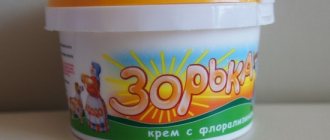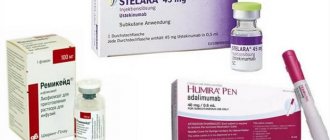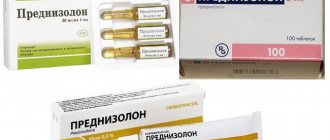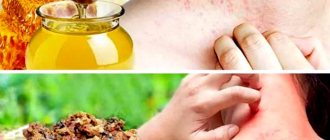Instructions for use
The effectiveness of eliminating the symptoms of allergic rhinitis with the help of the drug Tizin Alergy depends on how correctly the drug is used.
Before the first use, it is imperative to prepare the device; for this you need to:
- Remove the protective cap from the bottle;
- Press the sprayer 3-4 times, pointing it to the side. A whitish “cloud” should appear;
- The medicine is ready for use;
- Before each spray, the bottle must be shaken vigorously.
Tizin Alergy is sprayed into each nasal passage at 100 mg, that is, 2 doses. Frequency of use – 2 times a day at regular intervals.
In case of acute rhinitis with severe symptoms, the doctor may prescribe a spray for spraying 3-4 times a day for several days.
Before spraying the drug, the nasal passages must be cleared of mucus.
Immediately during the administration of the medicine, you must inhale through the nasal passages.
Contraindications for use.
Tizin Alergy is not prescribed:
- Children under 6 years old;
- Patients with hypersensitivity to one of the components of the drug.
Overdose.
There are no reliable cases of levocabastine overdose. If a large amount of spray accidentally gets into the oral cavity and digestive tract, tachycardia appears, blood pressure decreases, and drowsiness appears.
Treatment for such poisoning consists of accelerating the elimination of levocabastine; this can be achieved by drinking large quantities of water.
Side effects.
Tizin Alergy causes few adverse reactions. Less than one percent of patients in clinical studies experienced the following changes:
- Nausea;
- Headache and occasional dizziness;
- Drowsiness;
- Painful sensations in the larynx and pharynx, dry cough;
- Bleeding from the nose;
- Pain, burning and dryness in the nasal passages;
- Increased fatigue;
- In rare cases, tachycardia and allergic reactions, manifested by bronchospasm, shortness of breath, swelling of the eyelids.
Directions for use and dosage
The drug is used intranasally. Each nasal passage is irrigated 2 times a day (100 mcg at a time) with an interval of 12 hours - morning and evening.
It is recommended to use the drug until all symptoms of the disease disappear. If it is severe, with prior agreement with your doctor, you can increase the frequency of use of the drug to 3-4 times a day (150-200 mcg) until severe signs of allergic rhinitis are eliminated.
Before using Tizin Alergy spray, according to the instructions for use, you need to thoroughly clean the nasal cavity and take a deep breath through your nose during the treatment itself.
Before the first use, remove the protective cap from the new bottle and press the nozzle several times, trying to achieve a spray effect in the form of a small cloud.
Then the nozzle is inserted shallowly into the nasal cavity and pressure is applied. At this time, the patient is required to take a breath while pressing the bottle, as if he wants to inhale the medicine as deeply as possible. The same procedure is carried out with the second nasal passage. Before subsequent uses, the bottle with the drug must be shaken.
Few people know that Tizin Alergy can also be used to treat allergic conjunctivitis by instilling a solution into both eyes. To prevent microbial contamination, it is necessary to prevent the eyelid mucosa from touching the eyelid with a pipette and keep the bottle with the drug tightly closed.
In this case, it is not recommended to combine treatment with the drug with wearing soft contact lenses, since there is a possibility of a negative effect of benzalkonium chloride, which is part of the drug, on them.
Composition and release forms
The product is a colorless solution with a slight odor.
Produced in the following forms:
- Nasal spray with two dosage options - 0.05% and 0.1%. Available in a plastic bottle with a special nozzle for spraying the contents (designed for approximately 140 times).
- In the form of drops. In this case, the bottle comes with a dosing spout (designed for 70 times of use).
The bottles are made of dark glass and contain 10 ml of solution. Sold in a cardboard box.
The active substance of the drug is tetrizoline hydrochloride:
- at a concentration of 0.05%, 1 ml of the drug contains 500 mcg of the substance (one dose - 35 mcg);
- at a concentration of 0.1%, 1 ml of spray contains 1 mg of the substance (one dose - 140 mcg).
Additional components in 1 ml of solution - benzalkonium chloride - 0.2 mg, sorbitol 70% - 20.0 mg, sodium chloride - 4.16 mg, sodium dihydrogen phosphate dihydrate - 3.38 mg, disodium hydrogen phosphate dihydrate - 2.08 mg, disodium edetate – 1.0 mg, water.
Contraindications
The use of Tizin allergy spray is strictly prohibited under the following conditions:
- pathologies of vascular origin, as well as rhythm disturbances (tachycardia);
- tendency to high blood pressure;
- if you are taking medications that affect an increase in blood pressure (MAO inhibitors);
- the presence of atherosclerotic changes;
- children under 6 years of age (regarding the spray form 0.1%);
- children under 2 years of age (regarding the spray form 0.05%);
- a history of surgical interventions on the meninges;
- atrophic form of rhinitis;
- the presence of individual intolerance to any component of the drug.
You should also be vigilant when prescribing the drug to people:
- those suffering from diseases of the cardiovascular system;
- having benign and malignant neoplasms;
- diabetes mellitus of all types;
- pheochromocetoma and thyrotoxicosis.
Read how an allergy to lidocaine manifests itself. How does a mold allergy manifest? The answer is here.
Instructions for use
Before using the medicine, you must carefully read the instructions.
- A solution with a concentration of 0.1% is intended for adults. In the absence of additional recommendations, it can also be used to treat children aged 6 years and older. Prescribed 2,3 or 4 drops of solution in each nasal sinus 3-4 times a day. For the spray - 1 spray into each nostril, 2-3 times daily.
- The drug 0.05% is used to treat children aged 2 to 6 years. The dosage is 2-3 drops in both nostrils. Apply 3-4 times daily. Spray - 1 spray on each side, 1-2 times a day.
To obtain optimal results, it is necessary to maintain an equal time interval between the use of the medicine (about 4 hours).
If 1-2 times a day is enough, then you should not increase the frequency of administration.
There is no need to use Tizin at night. It is enough to use it immediately before bed. The effect of the drug lasts about 8 hours.
The duration of treatment with Tizin for adults is 5 days, for children 3 days. After this time, you need to take a break.
Re-use is possible after 4-5 days.
Storage conditions and periods
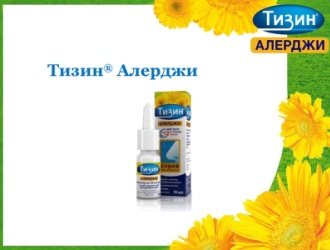
The medicine should be protected from direct sunlight on the bottle. It also needs to be out of reach of small children.
The shelf life of this medicine is two years. After this time has expired, use of the spray is prohibited.
Release form and composition
Tizin Alergy is available in the form of a spray. The drug solution is a white suspension; one dose contains 50 mcg of active substance.
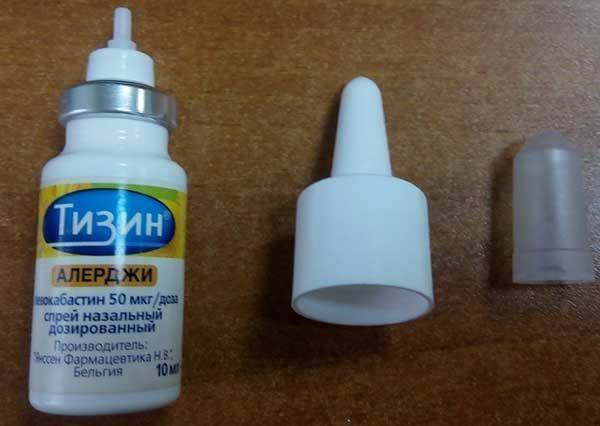
The ATC code of the drug is R01AC02. The main active ingredient of levocabastine is levocabastine.
Excipients used for the production of the drug:
- Propylene glycol;
- Sodium hydrogen phosphate;
- Sodium hydrogen phosphate monohydrate;
- Hypromellose;
- Benzalkonium chloride;
- Polysorbate;
- Disodium edetate;
- Water for injections.
The suspension is placed in polyethylene bottles, each of which contains 10 ml of solution, which is 100 doses. The bottles are equipped with a dispenser and a protective cap.
TYZINEALERGY is produced in Belgium by JANSSEN PHARMACEUTICA, NV
Clinical and pharmacological group.
The drug is an antiallergic drug and is used topically in ENT practice.
Pharmacotherapeutic group.
Tizin Alergy belongs to the H1-histamine receptor blockers.
After intranasal use, sneezing, nasal discharge, itching and congestion begin to decrease after about 5 minutes.
The therapeutic effect lasts for 12 hours.
Levocabastine binds to blood proteins by 55%. The half-life reaches 35-40 hours; the drug is excreted unchanged by the kidneys.
Contraindications
The most common contraindications for treatment using Tizin Alergy include:
- Individual intolerance to any of the chemical components that are part of the drug.
- Children under six years old.
- The drug should be used very carefully in elderly people, as well as those who suffer from impaired renal function.
During pregnancy and lactation

In this regard, the medicine is prohibited from being used throughout pregnancy, except in cases where the benefit to the mother will significantly exceed the possible risk for the normal development of the child. In addition, it is known that the active substance can enter the child’s body along with the mother’s breast milk during feeding. Therefore, extreme caution must be exercised when treating women who are breastfeeding with nasal spray.
If treatment with Tizin Alergy is mandatory, then it is recommended to interrupt breastfeeding.
Overdose
The risk of exceeding the drug norm arises if the instructions for use are not followed. It is also very undesirable for children and women to ingest the solution during pregnancy.
An overdose of a medicine can lead to the following consequences:
- depression of the central nervous system (CNS). This manifests itself in the patient as increased drowsiness, bradycardia, and hypotension. There may be a decrease in body temperature;
- a feeling of nausea, hypertension, and tachycardia appears. Possible dilated pupils;
- in more severe cases - cardiac arrhythmia, pulmonary edema, cardiac arrest.
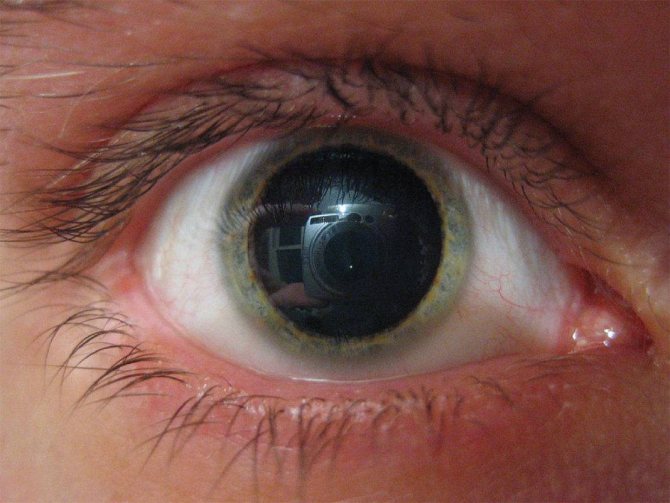
If an overdose is suspected, the following measures must be taken:
- the patient stops using the drug;
- gastric lavage is prescribed;
- the patient takes activated charcoal;
- anticonvulsants are sometimes prescribed;
- if it is necessary to lower blood pressure, Fentolomine is prescribed. It is necessary to take 100 mg orally, or 5 mg intravenously in saline solution.
If the symptoms of an overdose are severe, then it is imperative to seek medical help. Likewise, if the patient is a child, an elderly person, or a pregnant woman.
special instructions
The drug Tizin in the form of a spray or drops should not be used longer than the time specified in the instructions. Otherwise, this may be fraught with the development of reactive redness of the mucous membrane of the nasal concha.
Also, increasing the period of use of the product can cause dependence, which can lead to the development of:
- vasomotor rhinitis;
- atrophy of the nasal mucosa;
- decreased olfactory function;
- as well as airway obstruction.
In case of allergic rhinitis, the use of the drug Tizin should be carried out under the strict supervision of a medical specialist in order to avoid the development of addiction and, as a result, atrophic changes in the mucous membrane.
Regarding the effect on the ability to drive and perform mechanical work, we can say that only in cases of increasing the duration of use of the drug or non-compliance with dosages, it is possible to develop a systemic effect on the body.
This may result in increased sleepiness and decreased attention.
Analogues of Tizin Alergy
The drug has few analogues. The following drugs have a similar medicinal effect:
- Levocabastine;
- Histimet;
- Reactin;
- Visin Alergy.
But it is not recommended to replace the drug Tizin Alergy with them without medical advice.

In most cases, patients who have used this intranasal drug respond positively to it. If Tizin Alergy does not help, the symptoms of allergic rhinitis and hay fever are not alleviated, you should consult your doctor. It may be necessary to replace the drug with a product with another active ingredient similar in spectrum of action.
Treatment of allergic rhinitis is the prerogative of an allergist. In this case, prescribing Tizin Alergy and self-medicating is contraindicated. At best, such actions will not have the desired result, and at worst, they can aggravate the allergic reaction and, at the same time, a runny nose, provoking the development of new serious complications.
A doctor may recommend this intranasal spray as an independent remedy for the treatment of a runny nose, or as part of a complex therapy aimed at treating various types of allergic diseases.
Drug interactions
Drug interactions of Tizin Alergy with other drugs and substances:
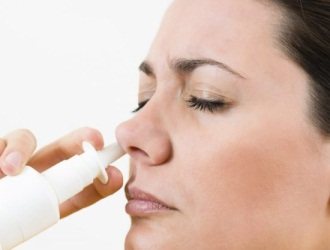
When carrying out combination treatment therapy with the simultaneous use of Tizin Alergy and various inhibitors of the CYP3A4 isoenzymes erythromycin or ketoconazole, no change in the pharmacokinetics of levocabastine is observed.- No interaction of the active component with alcohol was observed. In addition, there was no increase in the effects of alcohol on the patient’s body as a result of taking Tizin Alergy in recommended doses.
- In some cases, local interaction with other intranasal drugs occurs. It has been studied that combination with Oxymetazoline can lead to a temporary decrease in the absorption of levocabastine.
Pharmacological properties, composition, price, pros and cons of the drug
Tizin Alergy is an antiallergic drug. According to the instructions for use, Tizin Alergy has a direct effect on histamine receptor blockers.
After using the drug, the patient’s symptoms of allergic rhinitis disappear in a short period of time. Nasal discharge stops, swelling of the mucous membrane goes away.
Indications for use of Tizin Allergy are:
- allergic rhinitis;
- hay fever in the acute stage in the form of rhinoconjunctival syndrome;
- allergic conjunctivitis.
The drug is available in the form of a nasal spray. One 10 ml bottle contains a homogeneous suspension of white opaque color, equal to 100 doses. Tizin Alergy contains levocabastine hydrochloride 540 mcg as the main active ingredient.
When Tizin Alergy is administered intranasally in a volume of 1 dose, 30 mcg of levocabastine hydrochloride is absorbed. Its concentration in the blood reaches peak values 3 hours after using the drug. The binding of the active substance to plasma protein fractions is at least 55%.
The drug is excreted by the kidneys almost unchanged within 35–40 hours.
The cost of Tizin Alergy varies between 210–300 rubles.
The advantages of the drug are a quick effect, complete elimination of the symptoms of allergic rhinitis, and improved quality of life for the patient.
With the correct dosage, it does not have a negative effect on the reaction rate and does not cause a sedative effect, therefore, during treatment, the patient is allowed to use a vehicle and engage in unsafe types of work.
The exception is when the drug causes an individual reaction in the patient in the form of increased drowsiness.
The disadvantages include the undesirability of using the drug in children under 6 years of age and in pregnant and nursing mothers. In addition, Tizin Alergy may cause side effects.
Possible side effects
A negative response to the active substance and excipients has a different frequency: from 1 case or more per 10 people to less than 1 case per 1000 patients. If the dosage and frequency of use are observed, negative reactions of mild and moderate severity rarely appear; pronounced complications occur in a minimal percentage of patients, more often with an overdose. Before starting treatment, it is important to study the instructions and clarify possible side effects.
Negative reactions occur relatively often:
- fatigue;
- nausea;
- sinusitis;
- headache;
- discomfort in the larynx and nasopharynx;
- nosebleeds;
- dizziness.
Rarely does a negative response manifest itself in the form of the following reactions:
- nasal congestion;
- hypersensitivity;
- swelling of the nasal mucosa;
- anxiety;
- dry nasal passages;
- tachycardia;
- bronchospasm;
- swelling of the eyelids;
- dyspnea;
- feeling of rapid heartbeat.
On a note! If the drug is accidentally used, a slight sedative effect and a decrease in blood pressure are possible. To quickly remove levocabastine from the body, it is recommended to drink a large volume of clean water.
Opinions about the drug
In general, reviews from the use of Tizin are positive:
We were visiting friends at their dacha. My daughter (4.5 years old) had a slight cold and her nose was swollen. Fortunately, they found Tizin (suitable for children). After 2 days everything went away. Maybe the drug helped so quickly, or maybe we just started treatment on time. But the child is healthy! I'll take a note.
Elena, 37 years old
Allergies are common in spring and autumn. The nose swells, it is impossible to breathe. There is not always enough time for a doctor. This is the second year I’ve been buying Tizin, I don’t need a prescription. I can use it several times a season if necessary. Not a bad thing. True, you need to take breaks so as not to get used to it.
Ruslan, 24 years old
I often go on business trips. Problems with a runny nose, the nose often swells. Interferes with work and negotiations. I bought Tizin by chance at a nearby pharmacy. After 2-3 times I already felt relief. The runny nose has not disappeared at all, but you can sleep normally and carry out work activities. And the price is ridiculous.
Nikolay, 42 years old
Price policy
From the point of view of pricing policy, the price of this drug is more likely to fall into the “budget” category, which is a big advantage over analogues of this drug.
Find out how an allergy to iodine manifests itself. How to determine what adults are allergic to? Details in the article.
Where can I get allergy tests done for my child? Read more.
Instructions for use
The drug should be taken according to the dosage prescribed by the doctor after examining the patient. The drug is administered nasally to adult patients and children after the age of six. 2 doses are administered into each nostril twice a day. With pronounced symptoms of allergic rhinitis, the number of injections is increased to 3-4 times per day.
It is worth noting that when driving a car and using the spray you need to be extremely careful. Due to the occurrence of drowsiness during therapy, decreased concentration and alertness may occur. Therefore, if this symptom bothers the patient, hazardous activities should be abandoned during treatment.
Indications
The drug is recommended for use in the following cases:
- the need to achieve an anti-edematous effect and relieve redness of the mucous membrane of the nasal passages, as well as reduce discharge in case of allergic and infectious rhinitis, sinusitis, otitis media, hay fever;
- for preparing the nasal cavity of patients before carrying out diagnostic measures.
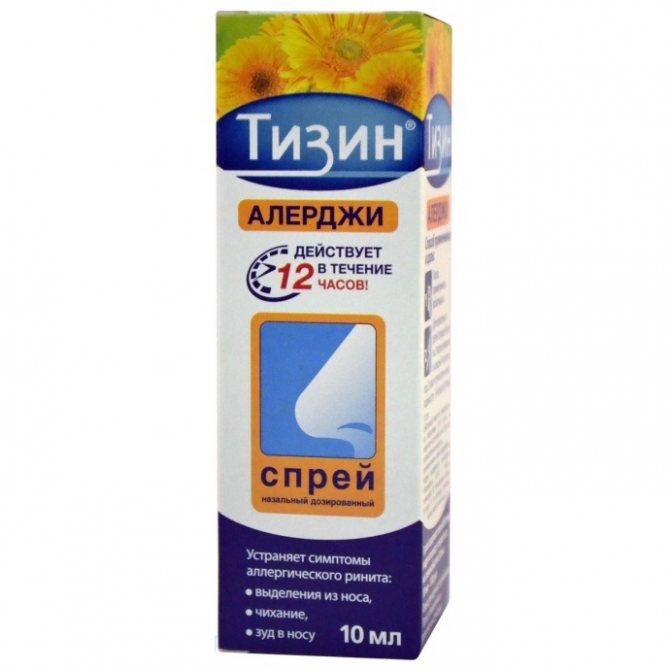
Photo: Spray



